“I
would say he was a poet and therefore indispensible.”
Testament of Orpheus is Jean Cocteau’s
farewell to film. Instead of making a film about someone or something he made
it about himself and his life as a poet and artist. He mixes the real, unreal,
and surreal to tell his story.
A
Poet (Cocteau) from around the time of the French Revolution keeps appearing
and disappearing in front of people from the modern past and present. The Poet
is looking for a professor. He first stumbles upon the man as a boy, then as a
baby being held and then dropped by his surprised mother, as an old man in a
wheelchair suffering from the affects of his mother dropping him and holding
bullets that the Poet needs, and finally he meets the professor in the present.
The bullets were created by the professor. They are made to travel at the speed
of light. The Poet needs one of those bullets to shoot him and bring him fully
into the present. The Professor shoots the Poet who quickly comes back up
dressed in modern clothing.
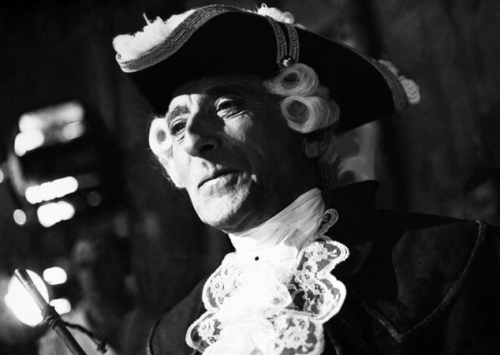
The
Poet walks out of the building. As he is walking down a road he passes a man
wearing the mask of a horse and a tail. The Poet follows the man back to a
gypsy camp among ruins of a building. At the camp he notices a woman handling a
photograph of Cégeste his poet character from his film Orpheus. The woman tears the photograph up and the Poet walks up to
her takes the pieces. The Poet walks to a cliff near the sea and throws the
photograph into the sea. Cégeste then comes up out of the water with a flower
in his hand. The Poet notices his character looks different to which the young
man replies that he was what the Poet had made him in his film.
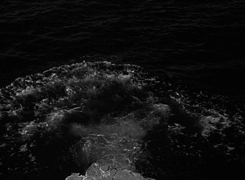
Cégeste
lead the Poet to a greenhouse where a canvas is. The Poet tries to draw the
dying flower but winds up drawing his self-portrait. Cégeste points out that
artists always wind up drawing themselves. In frustration the Poet crushes the
flower. Cégeste picks up the flower and
places it in a flower pot. Outside the greenhouse Cégeste gives the flower to a
“doctor” (a different version of the Poet) in a cap and gown and the “doctor”
puts it back together. Cegeste wants the Poet to give the flower to the goddess
Athena. The Poet refuses but Cegeste makes him because the Poet left him in the
middle of the mirrors where there is no life and there is no death. He takes
the Poet to a room. In the room is the Princess and Heurtebise from Orpheus. They are there to judge the
Poet with the charge of innocence and for going into different worlds. He is
being judged by two characters he had created they have become more than he had
imagined. The Princess and Heurtebise summon the Professor. The Professor had
just fallen asleep, he still is he has been brought to them through his dreams.
The Professor give evidence of the Poet being a good man and how he is
indispensible to the world and the arts. The Princess and Heurtebise condemn
the Poet to live out the remainder of his years on earth.
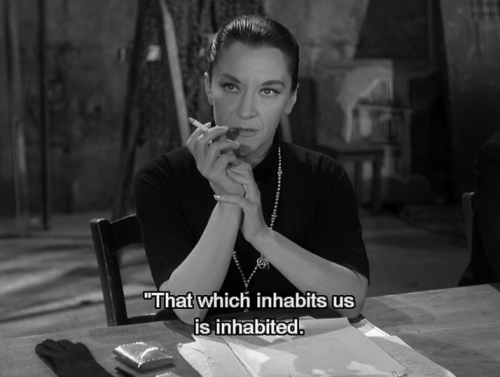
Cegeste
tells the Poet that the flower is alive with his blood and it is his destiny. The
character brings the Poet back to the ruins. They hear the voices of the
Princess and Heurtebise. Cegeste has to leave the Poet at this point. He has to
return to where he was left in Orpheus.
The
Poet comes upon a man at a desk (Yul Brenner). The man tells him to wait for
the one in charge. The Poet waits and waits a long time. Finally he is allowed
to see the person he has been waiting for. The flower reappears in the Poet’s
hand before he enters the room. He comes to a woman dressed as a gladiator and
two men dressed as the horses he saw at the beginning on either side of the
gladiator. The Poet goes to walk away from the gladiator but the woman throws
her spear and it pierces the Poet through the back. The Poet seems to have
died. He is laid on a funeral pyre and looked over by friends including the
artist Picasso and his family. The blood and the flower on the ground where the
Poet was killed turn to red symbolizing their link to one another.
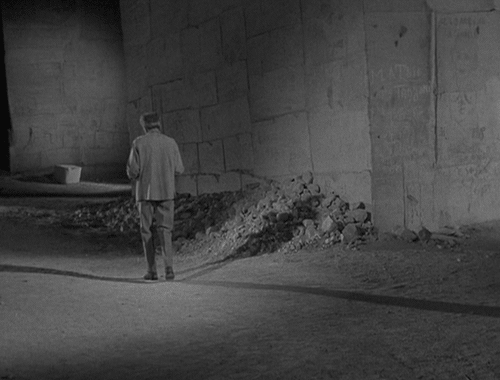
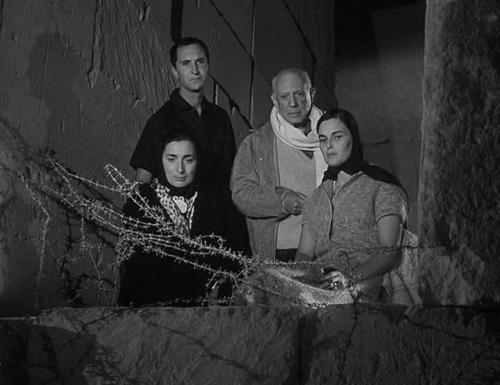
The
voice of the Poet tells the audience that “poets only pretend to be die.” The
Poet stands up off of his pyre and sleeps wakes down a road. He awakens when he
comes to a road on a hill. He hears two motorcycles like the ones from Orpheus
that signal impending death. The police officers stop and ask to see his papers
because he is just walking along a major road. At this moment Cégeste reappears
telling the Poet that he is not of this earth and takes him away before the
police notice he is gone.
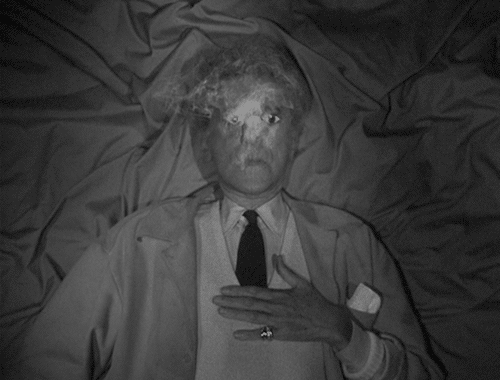
I
thought Testament of Orpheus was
brilliant. Cocteau had lived so many lives as a poet, an artist, and a
filmmaker. He explores these lives and his place in the universe through this
film. His exploration of the universe is shown and told in the way he saw it:
real, unreal, and surreal. I loved how he brought back his characters of Cégeste,
The Princess, and Heurtebise from Orpheus.
I believe they are his personifications of life and death and judgment. They
are his creations judging him as a person compared to how they have been
written to live their lives.
As
an art historian I always like learning about an artist’s motivation behind their
works. To understand an artist’s work is to understand their time periods,
their beliefs, and what influenced them to create their works. Jean Cocteau
explains and expresses his motivations and beliefs in all three of his films in
his Orphic Trilogy. Mirrors have always been symbol for death and other worlds.
They play significant roles in Cocteau’s films along with mythological
characters in the modern world. Testament
of Orpheus is art, poetry, and wonderfully beautiful filmmaking all in one.
It is a film I absolutely suggest seeing.
No comments:
Post a Comment